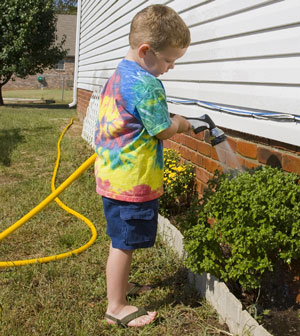Summer holidays is the time to get out in the garden and enjoy the results of your efforts made all year round
Watering
With summer holidays here, prepare your plants for those few hot days when you are away. Give them a good, deep watering during the next few watering cycles and top up the mulch with a fresh layer. If you have a water tank, make sure the pump is working and install a timer if you haven’t already done so.
Cool climate: Apply a fresh layer of mulch around your plants at about 75mm thick to help retain moisture in the ground.
Temperate: Recycle plastic drink bottles with screw caps: Fill them with water and screwing the cap back on tightly. Make a tiny hole in the cap and half bury the bottle pointing down in the garden next to your thirsty plants. Water will slowly drip out of the bottle, keeping the soil moist for up to five days.
Tropical: Install a dripper system to avoid overhead spraying on humid days. That way you use less water and reduce the risk of downy mildew and rust developing on your plants.
Pruning
Summer isn’t the best time for hard pruning, but many plants will be showing signs of overgrowth and will need a tip prune. Thinout productive plants such as fruit trees and vegetables to direct the sap flow right where it’s needed most.
Cool climate: Prune roses that have finished flowering and cut spent lavender flowers to the foliage line. Daisy bushes will benefit from a good prune in preparation for another burst of colour.
Temperate: Pinch back spent flowers on flowering annuals and remove infected leaves and overgrown shoots from the vegie plants to promote healthy new growth.
Tropical: Thin out heavy growth in fruit trees, creating better air circulation and providing more sunlight through to the centre of the trees. This will help grow and ripen fruit evenly.
Vegetables
Every time you are out in the garden picking vegies, inspect your plants for insect attack and viruses that can easily travel from plant to plant. Keep your plants well ventilated by thinning out the centres and removing any damaged leaves or branches. Spray them regularly with homemade organic oil and occasionally with bluestone mixture for extra protection.
Cool climate: If you are growing vegies in a hot-house, open the doors and windows at opposite ends to help create good air circulation during the daytime. A hot-house can easily be 10–15 degrees higher than the outside temperature.
Temperate: As the weather warms up, remove recycled plastic bottles from seedlings and polyurethane plastic used to create a mini hot-house for protection during the cooler months.
Tropical: Cover your vegies with shadecloth to protect them from hot sun and wind. This will also help save water. Carefully drape shadecloth over seedlings using garden stakes to prevent the shade cloth touching the plants.
Worm farm
While you’re busy working away in the garden aboveground, garden and compost worms are doing their bit, too. But they’ll need some help and protection during the hot days to come.
Cool climate: Remove the lid and add a few layers of wet newspapers on top of the compost to help keep it moist but not too wet; this will help to keep it cool during the day.
Temperate: Position the worm farm in a shady spot away from direct sunlight. Remove the lid and cover the compost with old bath towels or similar then give them a good soaking.
Tropical: Drain worm juice on a daily basis to avoid overheating the worms. Keep the worm farm in a well ventilated area and away from direct sunlight.
Bugs
Warm weather means great flowers and produce for us to enjoy, but it also means opportunities for pests and diseases to feast as well. Look out for any signs of bus and diseases and stop them in their tracks.
Cool Climate: Control scale on your citrus and other trees — signs of attack are black sooty mould and the presence of ants. Spray the trees fortnightly with organic garlic oil.
Temperate: Fruit fly is a menace at this time of year. Once they attack there’s no way of stopping them. Protect your precious produce by hanging recycled plastic bottles filled with honey and coke (directions on how to protect your plants from fruit fly in The Shed, page 42).
Tropical: Avoid downy mildew and target spot on your vegies caused by high temperatures and humidity. Target spot spores are readily dispersed by wind and rain, and splashing of soil particles creates wounds in the fruit for the spores to enter. Control the viruses by spraying them weekly with bluestone mixture







